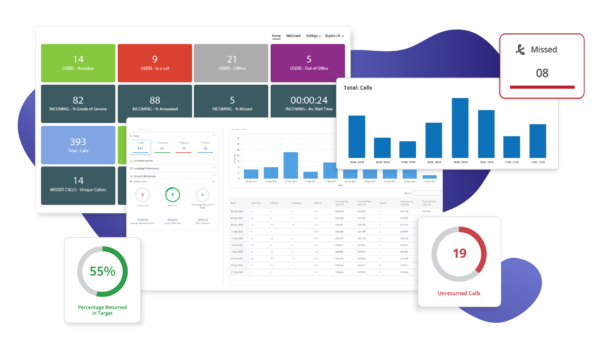Your customer service agents provide a direct link between your business and your customers. They are there to provide support and assistance, ensuring problems are dealt with quickly to leave customers satisfied. But the life of a customer service agent isn’t always an easy one. The nature of the job means that agents often handle difficult situations, including verbal abuse from dissatisfied and abusive customers. Not only that, but being overworked and stressed can also lead to employees feeling overworked and burnt out.
Over time, these pressures can cause call center agents to feel unmotivated, with low morale. And it’s easy to see why – over 32% of people have admitted to yelling at an agent, while 24% have sworn at one. This lack of motivation can cause no-call, no-show (NCNS) days, and can even cause employees to leave their roles.
So what can be done to help motivate your teams and improve morale? In this article, we’ll introduce some proactive measures managers can take to give your call center a boost.
The Importance of Agent Engagement
Agent engagement can play a key role in shaping the success and effectiveness of your call center. Engagement is about much more than just job satisfaction, it’s about the connection that employees have towards their work and the company they work for.
When your employees are engaged, it shows through their work. They are more productive and care about achieving results, leading to better call handling times and resolution rates – contributing to more positive overall customer experiences. When they are disengaged, however, they could soon experience negative impacts on their mental health and overall wellbeing. The wider consequences of this include reduced customer satisfaction, NCNS days and even redundancies.
It can be difficult to measure agent engagement for several reasons, including different interpretations of engagement, poor communication and a lack of data that can provide limited insights into your employees’ engagement. Finding ways to overcome these obstacles can help you find ways to strengthen your teams and help them feel more engaged in their work.
Challenges of Managing Remote Call Center Staff
Managing remote call center staff produces its own challenges. Since the pandemic, there has been a clear shift towards remote work for call center operations, which can come with its own challenges, such as:
- Isolation and Lack of Team Cohesion
One of the downsides to remote working is the lack of socialization. Many remote agents feel isolated in their work, and miss out on the opportunities to bond and develop relationships in the same way as they would in face-to-face office environments.
- Communication Barriers
Remote settings can lead to communication issues, including issues with connectivity, delays in receiving messages, and not getting the instant feedback that can improve performance.
- Monitoring Performance and Engagement
Another challenge that comes with remote working is that it can make it difficult to track and maintain high-performance levels. Businesses need specialist software to help monitor performance when it can’t be witnessed in person.
- Training and Development
Face-to-face interaction when learning has been proven to be more effective than virtually in many instances, online training may also be challening to deliver remotely.
- Maintaining Company Culture
Business owners may experience difficulties in implementing and sustaining a strong company culture for remote teams, which can make it difficult to sustain morale and employee wellbeing.
While businesses employing remote call center workers can face a variety of challenges, there are ways to implement different motivation strategies that work in the same way as traditional call centers. Below, we’ll discuss the different ways call center managers can motivate their teams, and will highlight particular areas that can be of help to remote teams.

Our Actionable Tips To Help Boost Agent Engagement & Improve Team Morale
Implementing strategies to boost engagement and enhance team morale in a call center environment can help maintain productivity and help deliver exceptional levels of customer service. Here are some useful tips that call center managers can adopt to help achieve their goals:
1. Implementing gamification
Gamification can help bring engaging and competitive elements to the workplace. Elements such as leaderboards, badges, and rewards can help bring an element of fun to your teams, making daily tasks more competitive to help increase motivation and productivity.
A gamification element works best when there are clear objectives, established rules, and regularly updated elements to help keep employees engaged. This is a strategy that can work for both in-person and remote teams with the help of virtual leaderboards and online challenges.
2. Hosting competitions and incentives
Sales competitions are an excellent way to help boost motivation thanks to incentives such as bonuses, gift cards, or recognition for top-performing agents. These types of incentives can help employees strive for excellence while encouraging healthy competition and receiving rewards for outstanding performance. It’s a strategy that can also work for remote teams to help maintain engagement.
All rules around competitions and incentives must be communicated openly, with achievable targets. Celebrating successes publicly can provide further boosts to employees.
3. Offering flexible scheduling
Flexible work schedules can help employees improve their work balance. From shift flexibility to remote working options, this type of flexibility can boost morale and lead to improved job satisfaction and reduced burnout.
To make flexible scheduling work, you must establish clear guidelines, while making the most of technology to ensure remote collaboration and ensure the fair distribution of workloads.
4. Providing regular training and development
Providing ongoing training programs, workshops, and skill development opportunities can help your agent grow professionally, helping to enhance their experience and increase job satisfaction. Investing in your employees demonstrates a commitment to them and their success, which can help boost engagement and build deeper connections to the company.
Start by identifying training needs for individual employees, and provide resources and learning opportunities to help them reach their goals. This can work for remote employees through virtual training sessions and online learning platforms.
5. Provide support via direct reports
Team leaders and managers should provide consistent support, feedback, and coaching to their direct reports. This not only helps build trust and boosts performance, but it can contribute to higher morale, while ensuring managers become aware of problems at an early stage.
This can be achieved by training managers on effective coaching techniques and promoting an open dialogue with their teams. Virtual one-on-one meetings and regular communication channels are essential for remote teams to receive the support they need.
6. Encourage open communication
Workplaces that have open communication policies can benefit from having employees who are willing to share ideas, concerns, and feedback. This helps build trust, transparency and greater collaboration within teams, creating a shared sense of purpose and motivation.
Common open communication techniques include regular team meetings and using feedback channels such as surveys and suggestion boxes to gather feedback. If your team work remotely then make sure to provide the same opportunities to ensure they also feel included and heard.

7. Setting clear expectations & goals
Employees benefit from having defined performance expectations, goals, and key performance indicators (KPIs) to help provide clarity and direction for their roles. It enables agents to focus on priorities and track their progress.
Communicate your expectations clearly and align individual goals with organizational objectives, and provide feedback on performance throughout the year. Objective setting can also benefit remote teams, providing direction while ensuring alignment and accountability with the rest of the organization.
8. Improving the working environment
A positive and supportive work environment can help promote employee wellbeing, collaboration, and creativity. This can lead to improvements in morale, reducing stress and higher job satisfaction, with a positive impact on productivity and retention rates.
Creating a better working environment can take time, and should be done in a way that is inclusive and respectful. Provide comfortable workspaces, collaboration, and breakout areas for those in the office, and ensure remote workers are given comfortable home working setups.
9. Managing agent workload
It’s important to ensure workload distribution is fair and manageable to help prevent agents from experiencing burnout and to maintain productivity. When workloads are more manageable, agents experience less stress and fatigue, and can perform better in their roles.
This can be achieved with careful monitoring of workload levels and ensuring tasks are prioritized effectively. Ensure there is more support available during peak periods – something that can also help protect against NCNS. Project management tools can be useful to track tasks and deadlines, which can benefit both in-person and remote teams.
10. Ensure agents are in the right role
It’s possible to increase motivation and job satisfaction by ensuring that agents’ skills, interests, and strengths, are aligned with their roles. Regular skill assessments, development opportunities and cross-training can all help your agents excel in their roles, whether they work in the office or if they work remotely.
11. Lead by example
One of the simplest ways to inspire teams is to lead by example, and demonstrate the desired behaviors and work ethic you expect of your agents. This not only builds trust and credibility, but can contribute to a positive working culture.
Open and honest communication is vital for leaders, who should show empathy, take ownership of responsibilities, and participate in team activities. Remote teams can benefit from effective virtual meetings and seeing leaders have a visible presence online to help set an example.
12. Avoid micromanaging
Your teams should be able to make decisions and take ownership of their work without constant supervision. This can increase autonomy, boost confidence, and morale, and help to promote a sense of accountability among your teams.
As you assign tasks, set clear expectations and provide necessary resources and support to help teams carry out their tasks. Avoid dictating every step of the task to help give employees the space to work independently.
For call centre managers for remote teams, we’ve created a guide on how to effictiverly manage your teams without being a micromanager.
13. Monitor call volume
Monitoring your call volume can help track and analyze trends to ensure that staffing levels are optimized and that your resources are allocated in the right places. This will not only improve the efficiency of your operations, but will help manage workloads for your teams and provide better service levels for your customers.
Analytics tools can be an asset for your business to track volume and create reports, allowing you to adjust staffing levels based on trends. Use tools that can work with your remote teams and leverage your insights to improve your scheduling patterns.
14. Host team-building events or social gatherings
Bringing teams together through team-building activities, social events, and even virtual gatherings can help agents build bonds, foster teamwork and boost morale. This will help improve communication and collaboration, leading to increased employee engagement and productivity.
Your activities program should be diverse and inclusive, ensuring everyone can get involved. You can make this work virtually with virtual team-building games and online social events designed to create connections among your remote teams.
15. Provide support for physical wellbeing
Creating a healthy workplace can help improve employee health, and reduce absenteeism, while increasing productivity and job satisfaction. Through providing resources, initiatives and support, you can help boost wellbeing and show employees that their health is valued.
There are different ways you can provide support, including supportive desk setups, health-related workshops and benefits and creating a culture of wellness amongst your teams. This can extend to your virtual teams by promoting healthy habits and ensuring that all agents take regular breaks from their desks and screens.
16. Allow agents independence
A final suggestion for improving agent engagement and morale is to empower agents to make decisions, solve problems, and manage their workflows independently. This encourages autonomy and creativity, while boosting job satisfaction and reducing dependency on managers.
Give your teams clear roles and responsibilities, provide training and resources to encourage self-management, and maintain trust in your agents to make informed decisions.
Incorporating Analytics 365 into Your Strategy
Using data can help business owners gain valuable insights that can help optimize performance and enhance employee engagement in call centers. For businesses using Microsoft Teams, Analytics 365 integrates seamlessly to analyze workplace activities.
Some of Analytics 365’s key features include call analytics, collaboration analytics and employee wellbeing monitoring. These tools can take the guesswork out of how your teams are performing, and can help you identify trends, busy periods and even possible cases of NCNS. With Analytics 365 providing the data, you can measure your efforts to improve engagement and motivation and adjust your strategies as needed.
Conclusion
While call centers can be challenging environments, they can be positive and inclusive places where agents feel motivated and happy at work. Making improvements stems from a robust strategy to drive employee engagement and morale, ensuring that both in-house and remote teams’ needs are taken into consideration. With the help of tools such as Analytics 365, you can assess the impact of your efforts, and identify further room for improvement that can contribute to the overall success of your business. Explore Analytics 365 in more detail and see the difference it can make to your call center.






